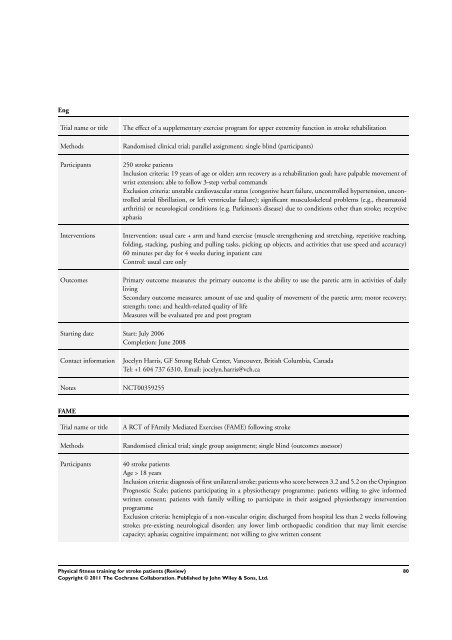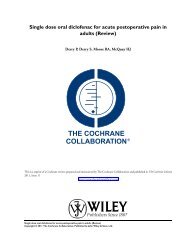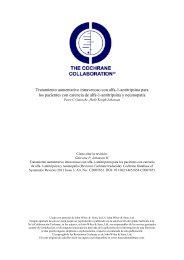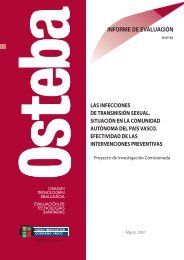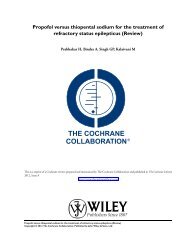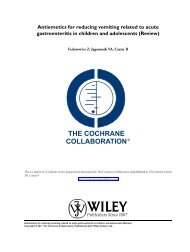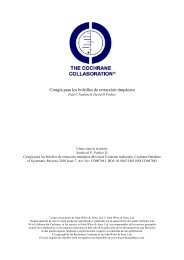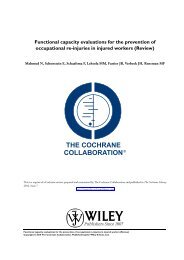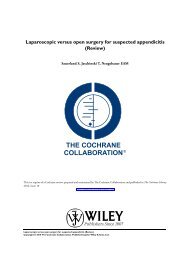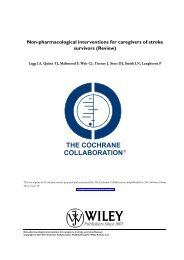Physical fitness training for stroke patients (Review) - Update Software
Physical fitness training for stroke patients (Review) - Update Software
Physical fitness training for stroke patients (Review) - Update Software
You also want an ePaper? Increase the reach of your titles
YUMPU automatically turns print PDFs into web optimized ePapers that Google loves.
Eng<br />
Trial name or title The effect of a supplementary exercise program <strong>for</strong> upper extremity function in <strong>stroke</strong> rehabilitation<br />
Methods Randomised clinical trial; parallel assignment; single blind (participants)<br />
Participants 250 <strong>stroke</strong> <strong>patients</strong><br />
Inclusion criteria: 19 years of age or older; arm recovery as a rehabilitation goal; have palpable movement of<br />
wrist extension; able to follow 3-step verbal commands<br />
Exclusion criteria: unstable cardiovascular status (congestive heart failure, uncontrolled hypertension, uncontrolled<br />
atrial fibrillation, or left ventricular failure); significant musculoskeletal problems (e.g., rheumatoid<br />
arthritis) or neurological conditions (e.g. Parkinson’s disease) due to conditions other than <strong>stroke</strong>; receptive<br />
aphasia<br />
Interventions Intervention: usual care + arm and hand exercise (muscle strengthening and stretching, repetitive reaching,<br />
folding, stacking, pushing and pulling tasks, picking up objects, and activities that use speed and accuracy)<br />
60 minutes per day <strong>for</strong> 4 weeks during inpatient care<br />
Control: usual care only<br />
Outcomes Primary outcome measures: the primary outcome is the ability to use the paretic arm in activities of daily<br />
living<br />
Secondary outcome measures: amount of use and quality of movement of the paretic arm; motor recovery;<br />
strength; tone; and health-related quality of life<br />
Measures will be evaluated pre and post program<br />
Starting date Start: July 2006<br />
Completion: June 2008<br />
Contact in<strong>for</strong>mation Jocelyn Harris, GF Strong Rehab Center, Vancouver, British Columbia, Canada<br />
Tel: +1 604 737 6310, Email: jocelyn.harris@vch.ca<br />
Notes NCT00359255<br />
FAME<br />
Trial name or title A RCT of FAmily Mediated Exercises (FAME) following <strong>stroke</strong><br />
Methods Randomised clinical trial; single group assignment; single blind (outcomes assessor)<br />
Participants 40 <strong>stroke</strong> <strong>patients</strong><br />
Age > 18 years<br />
Inclusion criteria: diagnosis of first unilateral <strong>stroke</strong>; <strong>patients</strong> who score between 3.2 and 5.2 on the Orpington<br />
Prognostic Scale; <strong>patients</strong> participating in a physiotherapy programme; <strong>patients</strong> willing to give in<strong>for</strong>med<br />
written consent; <strong>patients</strong> with family willing to participate in their assigned physiotherapy intervention<br />
programme<br />
Exclusion criteria: hemiplegia of a non-vascular origin; discharged from hospital less than 2 weeks following<br />
<strong>stroke</strong>; pre-existing neurological disorder; any lower limb orthopaedic condition that may limit exercise<br />
capacity; aphasia; cognitive impairment; not willing to give written consent<br />
<strong>Physical</strong> <strong>fitness</strong> <strong>training</strong> <strong>for</strong> <strong>stroke</strong> <strong>patients</strong> (<strong>Review</strong>)<br />
Copyright © 2011 The Cochrane Collaboration. Published by John Wiley & Sons, Ltd.<br />
80


